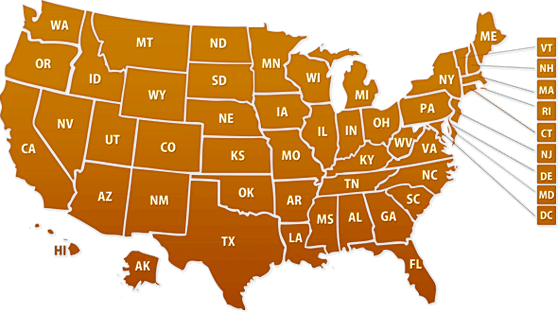Click on the map to begin your search

What Are Foreclosure Auctions?

As the name suggests, there are two basic details of foreclosure auctions that you need to be aware of:
- Homes being auctioned off to the public have been foreclosed on by the bank, due to the fact that he past owner did not live up to his or her financial obligation.
- The homes are sold via an auction process, being awarded to the highest bidder.
Generally speaking, foreclosure auctions are held once per month in counties throughout the United States. While not always the case, the majority of auctions take place at the county courthouse.
Benefits of Foreclosure Auctions
If you have never considered the idea of buying a home at a foreclosure auction, there is no better time than now to learn more about the benefits:
- The ability to purchase a home for much less than market value (sometimes up to 60 percent less).
- In some cases, several homes are being auctioned at the same time giving you the opportunity to purchase more than one if you are interested in a more advanced investment in the same general area.
- Contrary to popular belief, not all foreclosure auctions are crowded with homebuyers and investors.
Are Auctions Only for Investors?
Many people are under the impression that foreclosure auctions are solely for real estate investors. It is true that investors spend a lot of time combing these auctions, but it doesn’t mean this is the only group of people allowed to participate.
Anybody has the right to show up and place a bid, however, there are some finer details to consider.
- You have to register to place a bid, showing that you have the financial means to carry through with the purchase.
- At most foreclosure auctions the winner is required to immediately put down at least 10 percent of the winning bid.
- Within seven days you are required to pay the balance (this can and will vary from one auction to the next).
The most important thing to remember is this: you need to have your finances figured out before taking part in a foreclosure auction. Do you know when the balance of the money is due? Do you know how you are going to make the final payment?
Are Foreclosed Homes in Poor Shape?
Many people are under the impression that all foreclosure homes are in poor condition. This can definitely be the case, but is not true across the board.
Your job is to learn as much as possible about a home before bidding on it at auction. This way, there is less guesswork involved.
Some foreclosures are in bad condition because the past owner did not have the money and/or desire to keep up with the property. Others appear to be as good as new, due to the fact that the homeowner never gave up on the home and continued to care for it.
It is more common for foreclosures to be in bad shape, but this is not always the case.
Tips for Getting Involved with a Foreclosure Auction
Do you have the desire to get involved with a foreclosure auction in the near future? If so, these three tips will put you on the right path:
- Make note of where foreclosure auctions are taking place in your area.
- Obtain a list of the homes being sold at auction.
- Once you have a list of homes, learn as much as possible about each one.
- Have an idea of the homes that you are interested in.
- Set a budget and don’t go past this number for any reason.
- Be sure to have your finances in line before registering and placing a bid.
Now that you know more about foreclosure auctions, it may be time to get involved.

